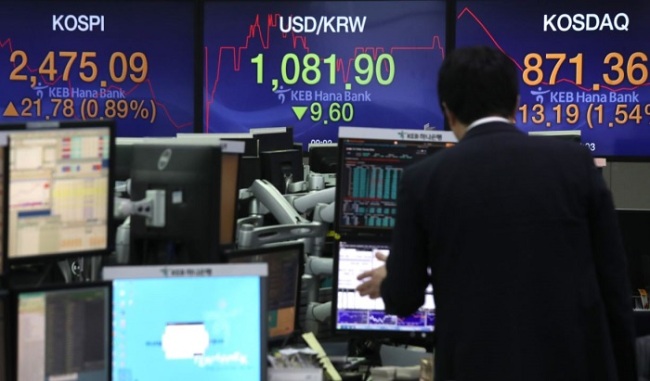US stock funds feared to exit Korea in case of rate reversal
By YonhapPublished : Feb. 7, 2018 - 09:42
US investors in South Korean stocks may flee the local market should America's interest rates rise above Seoul's benchmark rate, analysts said Wednesday.
The US Federal Reserve is tipped to jack up the federal funds rate three to four times this year on solid economic growth and rising inflationary pressure.
The Federal Open Market Committee, the Fed's rate-setting body, is widely projected to raise interest rates at a March 20-21 meeting, which would lead to a reversal of key rates in the two countries and prompt American investors to exit South Korea in search of higher returns.
The US Federal Reserve is tipped to jack up the federal funds rate three to four times this year on solid economic growth and rising inflationary pressure.
The Federal Open Market Committee, the Fed's rate-setting body, is widely projected to raise interest rates at a March 20-21 meeting, which would lead to a reversal of key rates in the two countries and prompt American investors to exit South Korea in search of higher returns.

Currently, South Korea's base rate stands at 1.5 percent, the same as the upper end of the US policy rate band. In November, the BOK hiked its key rate by a quarter percentage point to 1.5 percent amid clear signs of an economic recovery, snapping its 16-month standpat stance.
The analysts said concern is growing that a rate reversal may spark an outflow of US funds investing in South Korean stocks, which could throw cold water on the local stock market.
According to data from the Financial Supervisory Service, American investors held 265.1 trillion won ($244 billion) worth of South Korea's listed stocks as of end-2017, the largest among foreigners. The sum accounted for nearly 42 percent of all stocks owned by foreigners.
British investors came next with 48.3 trillion won, trailed by Japanese with 15.3 trillion won and Chinese with 11.7 trillion won.
The amount of US investment money represents a near fourfold increase from the end of 2008, when the Fed started its zero-rate policy that sparked an overseas exodus of funds to seek higher returns.
Last year alone, US investors' net buying of South Korean stocks exceeded 13 trillion won, powering the strong rally of the local bourse.
Market watchers said an outflow of US stock investment funds could become a reality as the US central bank may raise interest rates at a faster-than-expected pace of three to four times this year.
In contrast, South Korea's central bank is widely expected to jack up the key rate only one to two times this year because of South Korea's large household debt.
Such a projection raises the possibility of the first rate reversal in South Korea and the world's largest economy in 10 years, which would come as a negative for the local stock market, they said.(Yonhap)

















![[KH Explains] Hyundai's full hybrid edge to pay off amid slow transition to pure EVs](http://res.heraldm.com/phpwas/restmb_idxmake.php?idx=652&simg=/content/image/2024/04/18/20240418050645_0.jpg&u=20240419100350)

![[Today’s K-pop] Zico drops snippet of collaboration with Jennie](http://res.heraldm.com/phpwas/restmb_idxmake.php?idx=642&simg=/content/image/2024/04/18/20240418050702_0.jpg&u=)